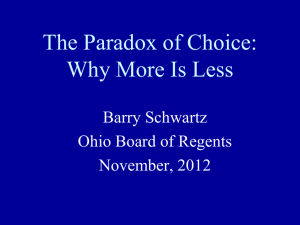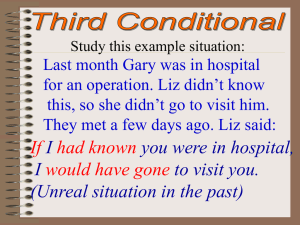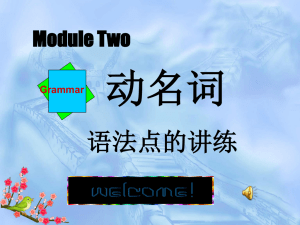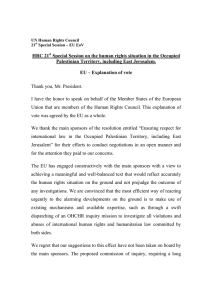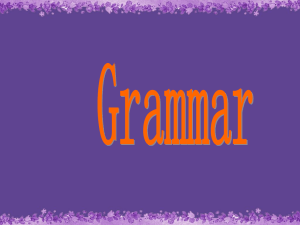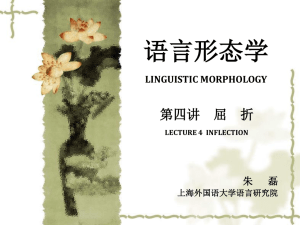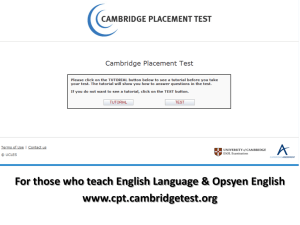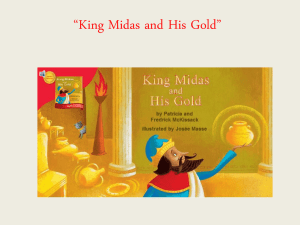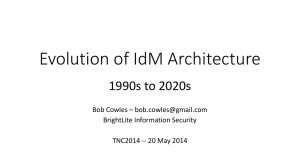On the psychology of `if only`: Regret and the comparison between
advertisement
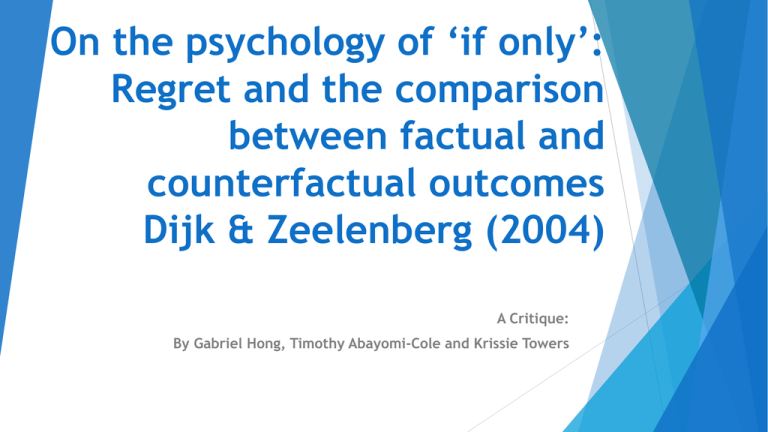
On the psychology of ‘if only’: Regret and the comparison between factual and counterfactual outcomes Dijk & Zeelenberg (2004) A Critique: By Gabriel Hong, Timothy Abayomi-Cole and Krissie Towers Content Page Background information The comparison process in regret Methods Experiment 1 Experiment 2 Experiment 3 Sample issues How appropriate is the study design – scenario study problems Statistical analyses Validity of the measure of regret Research Relevance Conclusion References Background Information Regret is a negative emotion, we experience it when we realise or imagine that our current situation could have been better had made different choices. Factual outcome = the obtained outcome Counterfactual outcome = The missed outcome that could have been attained had you behaved differently. e.g. Selecting 1 box out of 3, each box have a token. If you select the box with chocolate in it, the chocolate is the factual outcome In the other 2 boxes there were flowers, the flowers would therefore be the counterfactual outcome. This paper argues that there is a lack of psychological research concerning the comparison process that is so essential to the experience of regret (how factual outcomes compare to counterfactual outcomes) The comparison process of regret There are 2 issues to address regarding regret, specifically in the comparison process between counterfactual and factual outcomes The researchers aimed to solve these through 2 experiments: Uncertainty (experiment 1) Whether you are certain or not about what the outcome could have been if you behaved differently can affect the amount of regret felt Category (experiment 2) Whether counterfactual outcomes are of a similar or different type will play in a role in influencing the comparison process generating regret An additional aspect explored in this paper is the effect of Individual differences: Individual Difference and their effect upon regret (experiments 3) Whether having a high or low need to compare yourself to others influences how much regret one feels. Experiment 1 Hypothesis: Uncertainty about what could have been will reduce feelings of regret Method: 108 students were randomly sorted into 4 groups and were asked to imagine that they’d picked one of two boxes, each of which had a token hidden in it Regardless of what box they picked, all won a squeezy stress ball. Of the 4 groups, 3 were told of the token that they had missed out on a CD of their choosing, a walkman, or ‘a dinner for two’ respectively. The last group was not told specifically what token they missed out on. After this, participants indicated to what extent they would feel regret (1 not at all; 9 very much). Experiment 1 Findings: The students in the uncertain condition were found to have significantly lower regret. It was also found that students who missed out on a CD had a significantly lower level of regret than those who missed out on a more expensive prize. (dinner for 2, Walkman) Conclusion: They have therefore shown, that knowing what the alternative outcome would have been, i.e. removing the sense of uncertainty, intensifies the feeling of regret. Experiment 2 Hypothesis: Regret is more intense if the counterfactual and factual outcomes come from different product categories. Method: Students were asked to imagine playing the penultimate “guaranteed-win” lottery scratch card. In the “same category” condition, students were informed that they won a €15 book (drinks) token but missed out on a €50 book (drinks) token In the “different category” condition, students informed they won a €15 drinks (book) token were informed they missed out on a €50 book token (drinks). Students were then asked to rate how much regret they would feel on a 7 point scale (1 = not at all; 7 = very much). Experiment 2 Findings: More regret was anticipated when the obtained and missed outcome were from the same category compared to when they were different. Conclusion: Comparability seems to be at the basis of regret, and that incomparability may shield people from the experience of regret. Experiment 3 Method: 74 students volunteered to participate. At the beginning of the academic year the Iowa-Netherlands comparison orientations measure (INCOM) was administered. Those who fell in the highest and lowest 30% recruited 8 months later. 2 (Missed token) x 2 (comparison orientation) design. Randomly assigned to one of four conditions (Missed token: €50 book token vs. €50 liquor store token) x 2(comparison orientation: low vs. high). All participants informed that they’d won a €15 book token. Informed that the remaining scratch card was bought by someone else: Half told that the other person had won €50 book token Other half told that the other person had won €50 liquor token After this participants were asked about how much regret they would feel Experiment 3 Hypothesis: That people with a high need to compare would be less influenced by the difficulty to compare, and thus they would suffer from regret. Findings: main effect of comparison orientation indicted that participants with a high need to compare reported more regret than participants with a low need to compare. Participants tended to report less regret when the missed token was from a different product category as the obtained token. Participants with a high need for comparison gave high regret ratings regardless of the product category of the missed token and vice versa. Conclusion: That the social comparison process seems add to regret. Therefore to try and understand the psychological processes leading up to regret it is useful to explicitly investigate the comparison process that lies at the basis of regret. Sample issues Experiment 1: Social Science students at Leiden University - 47 males, 61 females, mean age = 21.7 years Experiment 2: Social Science students at Leiden University - 66 males, 114 females, mean age = 21.08 years Experiment 3: First year Social Science at Tilburg University – 11 males, 63 females, mean age = 19.42 years Issues with the sample: All participants were students The majority of participants were females, especially in experiments 2 and 3 Mean age of participants in all experiments is 19-21 years Jokisaari (2003) used a sample of 176, ages ranging from 19-82 showing there are significant age differences in relation to the experience of regret Bjälkebring (2014) showed that younger adults reported more experiences and anticipated regret than older adults. How appropriate is the study design? Participants were merely imagining regret rather than experiencing it – Regret ratings primarily reflected participants predictions on how they think they would feel. When people anticipate how they will feel, they insufficiently anticipate the post decisional processes – such as dissonance reduction, self-deception, ego defence, emotion-based coping (Gilbert and Ebert, 2002) People may overestimate the regret (Gilbert, Morewedge, Risen, and Wilson 2004) Statistical analyses problems The paper uses three different p values as being ‘significant’ (p<.01. in Experiment 1, p<.001 in Experiment 2, p<.05 in Experiment 3) From a statistical point of view Scale of 1-9 this does not provide enough interpolating points of view. We cannot assume the normality required to conduct a one way ANOVA i.e. our data is too compact. In Experiment 3 in the investigation of main effect of a missed token the ANOVA returned figures of F(1,70) = 3.77, p< .06. The results for experiment 3 do not explicitly mention a comparison of variation. The validity of the measure of regret Inconsistent scales measuring regret 9 point scale for experiments 1 and 3 and a 7 point scale for experiment 2 Psychometric literature generally suggests that having more scale points is better but there is a diminishing return after around 9-11 points (Nunnally, 1978) Single item measure of regret Is the research relevant? Retaining Consumer Loyalty AT&T vs. MCI Capturing Market share V8 (beverage not engine!) Conclusion Paper does attempt to address an issue that has real world implications Comparison process has not been investigated thoroughly before However: We did not feel as if the paper was written in a coherent manner The inclusion of what was considered significant was not included in the introduction Design not written up clearly enough e.g. paragraph on pilot on materials for experiment 1. Results not considered significant by the scientific community were reported as being significant i.e. main effect of missed prize in experiment 3 Although, acknowledged in the discussion, the relevancy of the findings of this paper are ambiguous as an imaginary scenario study was conducted Future studies should look to conduct a real-life scenario on regret. References Bjälkebring, P. (2014). Age Differences in Experience and Regulation of Affect. - doctoral Dissertation Camille, N., Coricelli, G., Sallet, J., Pradat-Diehl, P., Duhamel, J. R., & Sirigu, A. (2004). The involvement of the orbitofrontal cortex in the experience of regret. Science, 304(5674), 1167-1170. Gibbons, Frederick X., and Bram P. Buunk. "Individual differences in social comparison: development of a scale of social comparison orientation." Journal of personality and social psychology 76.1 (1999): 129. Gilbert, D. T., & Ebert, J. E. (2002). Decisions and revisions: the affective forecasting of changeable outcomes. Journal of personality and social psychology, 82(4), 503. Gilbert, D. T., Morewedge, C. K., Risen, J. L., & Wilson, T. D. (2004). Looking forward to looking backward the misprediction of regret. Psychological Science, 15(5), 346-350. Jokisaari, M. (2003). Regret appraisals, age, and subjective well-being. Journal of Research in Personality, 37(6), 487-503. Nunnally, J. C. (1978). Psychometric Theory. McGraw-Hill Book Company, pp. 86-113, 190-255. Tsiros, Michael and Mittal, Vikas (2000). Regret: A Model of Its Antecedents and Consequences in Consumer Decision Making Journal of Consumer Research, 26(4), pp. 401-417
